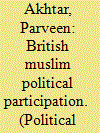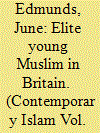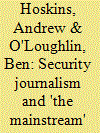| Srl | Item |
| 1 |
ID:
118231


|
|
|
|
|
| Publication |
2012.
|
| Summary/Abstract |
In this article I argue that there is a significant generational shift within British Pakistani communities in relation to political participation and civic engagement. Using George Galloway's March 2012 by-election victory in Bradford West and an analysis of primary empirical research conducted amongst British Pakistani communities between 2005-2007, and, 2011, I argue that kinship-based bloc voting-a feature of British Pakistani political engagement in UK politics-is being challenged. A younger generation of British Pakistanis want politicians to engage with them as individuals rather than politicians assuming their votes through co-opting Pakistani community elders in a system of patronage politics, an arrangement which has been in place since mass immigration from the subcontinent in the 1950s and 60s.
|
|
|
|
|
|
|
|
|
|
|
|
|
|
|
|
| 2 |
ID:
096521


|
|
|
| 3 |
ID:
167652


|
|
|
|
|
| Summary/Abstract |
This article revisits Critical Race Theory and brings it’s explanatory capacity to bear on the contemporary racialization of Muslims in Europe, most specifically the experience of British Muslim communities in education. The article argues that CRT can provide a theoretically fruitful means of gauging the ways in which anti-Muslim discrimination might be engendered through various strategies around securitization. In a social and political context characterized by a hyper-vigilance of Muslim educators in particular, the article concludes that applying CRT allows us to explore how a general latent whiteness is given political content through a particular racialization of Muslims.
|
|
|
|
|
|
|
|
|
|
|
|
|
|
|
|
| 4 |
ID:
168186


|
|
|
|
|
| Summary/Abstract |
This article revisits Critical Race Theory and brings it’s explanatory capacity to bear on the contemporary racialization of Muslims in Europe, most specifically the experience of British Muslim communities in education. The article argues that CRT can provide a theoretically fruitful means of gauging the ways in which anti-Muslim discrimination might be engendered through various strategies around securitization. In a social and political context characterized by a hyper-vigilance of Muslim educators in particular, the article concludes that applying CRT allows us to explore how a general latent whiteness is given political content through a particular racialization of Muslims.
|
|
|
|
|
|
|
|
|
|
|
|
|
|
|
|
| 5 |
ID:
096756


|
|
|
|
|
| Publication |
2010.
|
| Summary/Abstract |
News reporting of terrorism, in the form of security journalism, faces a set of challenges to the functions it serves as a result of both its own practices and the changing practices of news consumers. Security journalism performs some predictable functions, namely the regular delivery of representations of terrorist threats to a presumed national (and international) audience through coverage of Al-Qaeda leaders' speeches, bomb attempts, criminal trials, and 'radical' protests in Britain, among others. Security journalism offers a consistent repackaging of jihadist media productions from one context and language to another. For example, in reducing jihadist texts to short clips of an angry gesticulating man security journalism is prohibiting public understanding of their persuasive potential by cutting any political, religious or sensual appeals. This article presents original data from interviews with British Muslims familiar with jihadist materials that suggest mainstream media reporting may contribute to radicalization in ways not sufficiently appreciated by journalists, policy-makers and the public. Interviewees report that any news depicting Muslim suffering activates and reinforces frustrations and grievances, whether the source is a mainstream media outlet or Al-Qaeda's media wing. Mainstream media may unintentionally contribute to a more enduring but diffused resentment a priori to the existence of jihadist media; as one participant says, 'I am already convinced'.
|
|
|
|
|
|
|
|
|
|
|
|
|
|
|
|
| 6 |
ID:
161495


|
|
|
|
|
| Summary/Abstract |
A succession of media scandals and policy arguments in the UK in recent years has been integral to the construction of a so-called ‘Muslim Problem’. Media and political attention paid to Muslims in British public life, across a vast and varied range of issues, suggests a social preoccupation that exceeds the security framing the ‘War on Terror’ once imposed. In this article, we develop and apply Slavoj Žižek’s Lacanian theory of ideology to produce an original conceptual and analytic framework centred on the social functions served by, as well as the co-constitution of, anxiety and fantasy. We then apply this framework to explore three scandals relating to child sexual exploitation, halal meat and education. We show that the representations of British Muslims that these scandals entail are best understood as ideological fantasies, mobilized to suture traumatic gaps and conceal contradictions in wider social practices around such issues. We argue that the unrelenting media and political focus on myriad aspects of British Muslims’ imagined lives is symptomatic of what Žižek calls an ‘unbearable anxiety’: Islamophobic ideological fantasies conjure a ‘conceptual Muslim’ to sidestep confrontation with the Lacanian ‘Real’ – antagonistic and anxiety-inducing structures and practices underpinning British society, of which we do not speak.
|
|
|
|
|
|
|
|
|
|
|
|
|
|
|
|